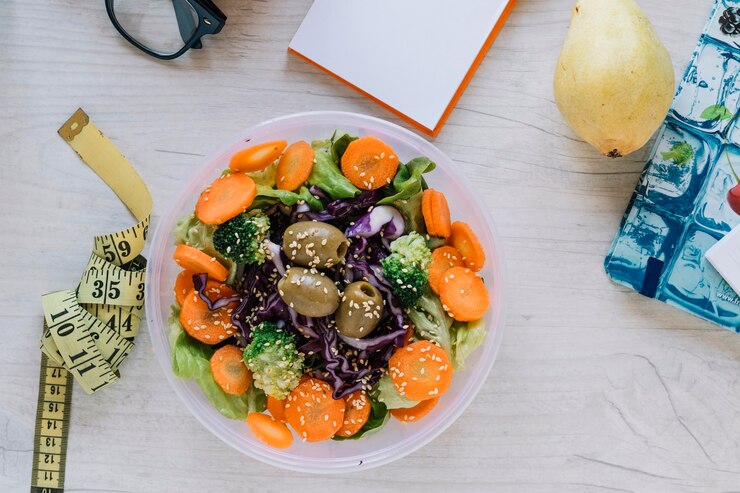
Which Food is Best for Weight Loss? Balancing Taste and Health
admin
- 0
- 21
The best foods for weight loss are lean proteins, whole grains, fruits, and vegetables. Including these foods in your diet helps to promote a healthy weight.
When trying to lose weight, it is important to choose nutrient-dense foods that provide essential vitamins and minerals while keeping you feeling full and satisfied. Lean proteins such as chicken, fish, and beans, whole grains like quinoa and brown rice, and a variety of fruits and vegetables are all ideal choices for a weight-loss-friendly diet.
These foods are high in fiber, which helps control appetite and promote a feeling of fullness. Additionally, they are low in calorie density, meaning you can eat a larger volume for fewer calories, which is beneficial for weight loss. By incorporating these foods into your daily meals, you can create a balanced, healthy diet that supports your weight loss goals.

Table of Contents
ToggleUnderstanding The Role Of Diet In Weight Loss
Diet plays a crucial role in weight loss, and understanding the impact of different foods on our bodies is essential for achieving and maintaining a healthy weight. In this section, we will delve into the key factors that influence weight loss and discuss the best foods to include in your diet to support your weight loss journey.
Caloric Density And Nutrient Content
When it comes to weight loss, the caloric density and nutrient content of foods are major determinants of success. Caloric density refers to the number of calories in a given volume of food, with low-calorie-dense foods containing fewer calories per gram. Prioritizing these foods can help control overall calorie intake, making it easier to maintain a calorie deficit for weight loss. On the other hand, nutrient-dense foods are rich in essential nutrients such as vitamins, minerals, and antioxidants, offering numerous health benefits while supporting overall well-being. Incorporating a variety of nutrient-dense foods into your diet can help ensure you get the essential nutrients your body needs while managing your weight.
Impact Of Macronutrients On Weight Loss
The macronutrient composition of your diet plays a pivotal role in weight loss. Proteins, carbohydrates, and fats are the three primary macronutrients that provide the body with energy and contribute to overall body composition. Including adequate protein in your diet can help promote feelings of fullness and preserve lean muscle mass while dieting. Carbohydrates, especially those from whole grains, fruits, and vegetables, can provide essential fiber and sustained energy to support an active lifestyle. Meanwhile, healthy fats, such as those found in avocados, nuts, and olive oil, can aid in nutrient absorption and promote satiety, helping to prevent overeating. Balancing the intake of these macronutrients is key to optimizing weight loss and maintaining long-term results.
Best Food Choices For Weight Loss
When it comes to achieving weight loss goals, choosing the right foods is essential. Incorporating whole foods, emphasizing lean proteins, and prioritizing fiber-rich options can significantly contribute to a successful weight loss journey. Making informed choices about the foods you consume can make a notable difference in achieving your weight loss objectives.
Incorporating Whole Foods
Incorporating whole foods into your diet can have a profound impact on weight loss. Whole foods are minimally processed and offer a wide array of essential nutrients. Opt for fresh fruits, vegetables, whole grains, and legumes to provide your body with natural sources of energy and nutrients. By including these whole foods in your diet, you’ll feel more satisfied and less likely to overeat.
Importance Of Lean Proteins
Lean proteins, such as chicken, turkey, fish, tofu, and legumes, are crucial for supporting weight loss. Lean proteins help to keep you feeling full and satisfied, reducing the likelihood of consuming excess calories. Additionally, they support muscle maintenance and repair, which is essential for an active lifestyle that promotes weight loss.
Emphasizing Fiber-rich Foods
Emphasizing fiber-rich foods is an effective strategy for weight loss. Foods like chickpeas, lentils, whole grains, and fruits are excellent sources of fiber. Fiber not only aids digestion and promotes gut health but also helps to keep you feeling fuller for longer periods. This can lead to reduced overall calorie intake, supporting your weight loss efforts.
Role Of Fruits And Vegetables In Weight Loss
When it comes to weight loss, incorporating nutrient-dense foods like fruits and vegetables into your diet can play a crucial role in achieving your goals. Fruits and vegetables are low in calories and high in essential nutrients, making them an excellent choice for promoting weight loss. They also provide a wide range of health benefits, including aiding digestion, regulating blood sugar levels, and reducing the risk of chronic diseases. In this article, we will delve into the benefits of incorporating fruits and vegetables into your weight loss journey, focusing on their role in promoting overall health and well-being.
Nutrient-dense Options
Fruits and vegetables are rich in essential vitamins, minerals, and phytonutrients, making them valuable additions to a weight loss diet. Incorporating a variety of colorful fruits and vegetables ensures that your body receives a wide array of nutrients, supporting overall health and aiding in weight management. From the vibrant orange of carrots and sweet potatoes to the deep green of spinach and kale, each color offers a unique set of nutrients, providing a diverse range of benefits for weight loss and overall well-being.
Benefits Of Fiber And Antioxidants
Fruits and vegetables are natural sources of dietary fiber, which promotes satiety, aids in digestion, and helps regulate blood sugar levels. Fiber-rich foods contribute to a feeling of fullness, reducing the likelihood of overeating and supporting weight management. Additionally, fruits and vegetables are packed with antioxidants, which help combat oxidative stress and inflammation in the body. These powerful compounds play a crucial role in supporting overall health and may aid in weight management by promoting a healthy metabolism and reducing the risk of chronic diseases.
Incorporating Healthy Fats For Weight Loss
When it comes to weight loss, many people tend to associate fats with weight gain. However, incorporating healthy fats into your diet can actually aid in weight loss. Understanding the role of healthy fats and how to differentiate them from unhealthy fats is crucial for anyone looking to manage their weight effectively. In this section, we’ll delve into the significance of incorporating healthy fats for weight loss and how omega-3 fatty acids can have a positive impact on weight management.
Differentiating Between Healthy And Unhealthy Fats
It’s essential to distinguish between healthy and unhealthy fats when it comes to weight loss. Healthy fats, such as those found in avocados, nuts, and olive oil, can contribute to satiety and provide essential nutrients. On the other hand, unhealthy fats, often present in processed and fried foods, can lead to weight gain and negative health outcomes. By prioritizing healthy fats in your diet, you can support your weight loss journey while reaping the nutritional benefits that they offer.
Impact Of Omega-3 Fatty Acids On Weight Management
Omega-3 fatty acids play a significant role in weight management. These essential fats, commonly found in fatty fish like salmon, as well as in chia seeds and flaxseeds, have been shown to aid in reducing inflammation and improving insulin sensitivity. By incorporating foods rich in omega-3 fatty acids into your meals, you can potentially enhance your body’s ability to burn fat and regulate your metabolism, making weight loss more achievable and sustainable.
Creating Balanced And Sustainable Meal Plans
Creating balanced and sustainable meal plans is crucial for achieving effective weight loss and maintaining a healthy lifestyle. A well-planned and balanced diet not only aids in weight management but also ensures the body receives the essential nutrients it needs. To promote sustainable weight loss, it’s important to embed healthy habits into your daily eating routine.
Importance Of Portion Control
Portion control plays a vital role in achieving weight loss goals. Consuming moderate portion sizes helps prevent overeating and unnecessary calorie intake. It is essential to be mindful of the portion sizes recommended for different food groups to maintain a balanced diet. Implementing portion control effectively allows individuals to enjoy their favorite foods while still managing their weight effectively.
Sustainable Eating Habits For Long-term Weight Management
Establishing sustainable eating habits is critical for long-term weight management. Focus on incorporating whole, nutrient-dense foods such as fruits, vegetables, lean proteins, and whole grains into your meal plans. By prioritizing wholesome and nutritious options, individuals can sustain their weight loss progress and foster a healthy relationship with food. Additionally, emphasizing mindful eating and building a positive mindset around food choices can contribute to a sustainable approach to weight management.
Frequently Asked Questions On Which Food Is Best For Weight Loss?
Which Foods Help Burn Belly Fat?
Foods that can help burn belly fat include avocados, lean protein, leafy greens, nuts, and seeds. Additionally, foods high in fiber, such as fruits, vegetables, and whole grains, can aid in weight loss and reducing belly fat. Proper hydration and moderate portions are also essential for a healthy diet.
What Foods Help Lose Weight Fast?
Foods like lean proteins, whole grains, fruits, and vegetables can aid in weight loss. They help manage hunger and provide essential nutrients. Additionally, foods high in fiber and protein can boost metabolism and promote satiety, aiding in weight loss.
How To Lose 20 Pounds In A Month?
To safely lose 20 pounds in a month, focus on a balanced calorie-controlled diet, combined with regular exercise. Eat plenty of fruits, vegetables, lean proteins, and whole grains, while limiting processed foods and sugary drinks. Stay hydrated and get enough sleep to support weight loss and overall health.
How Can I Lose Weight Fast?
To lose weight fast, combine regular exercise with a balanced diet. Focus on whole foods, fruits, vegetables, lean proteins, and stay hydrated. Avoid sugary drinks and processed foods. Consistency is key. Get enough sleep and manage stress. Consult with a healthcare professional before starting any weight loss plan.
Conclusion
The best foods for weight loss are those high in nutrients and low in calories. Incorporating a variety of fruits, vegetables, lean proteins, and whole grains into your diet can support your weight loss journey. Remember, moderation is key, and making sustainable lifestyle changes is crucial for long-term success.
Choose foods that nourish your body and support your health goals.



